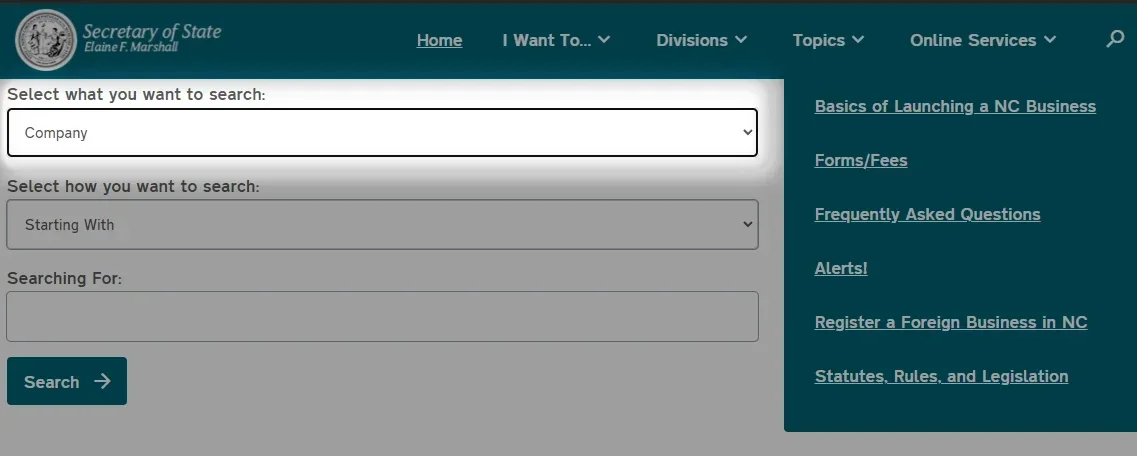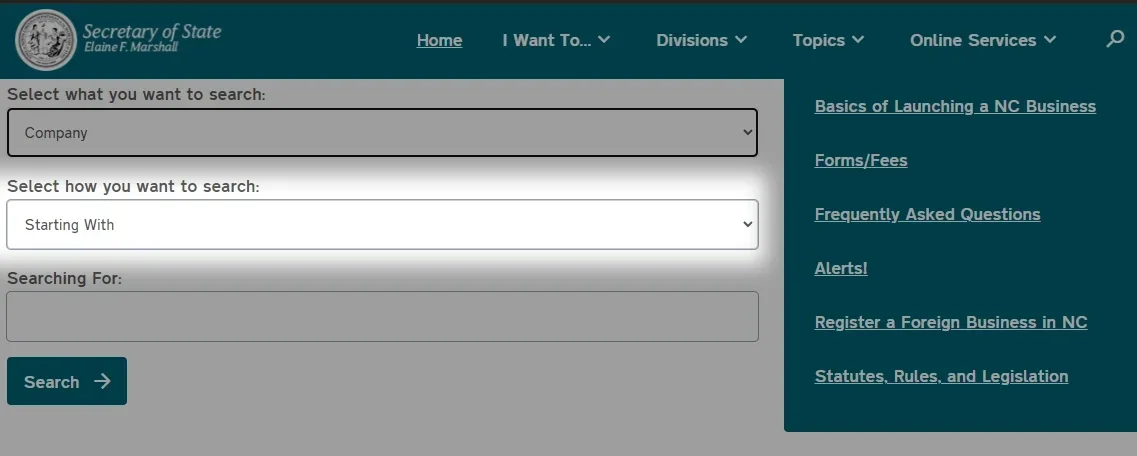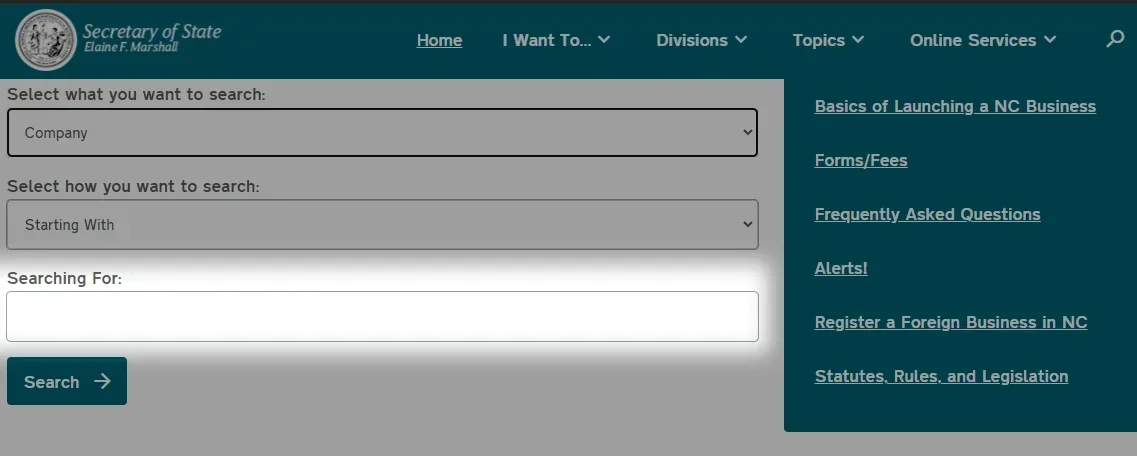Choosing the perfect name is a critical step in developing a new business entity, but it’s not always as straightforward as it seems. Legal requirements, trademarks, and pre-existing web content can make navigating the name selection process tricky. The first step in choosing a unique name for your business entity is a search of existing NC business entities.

North Carolina Secretary of State business search contact information
Here's the contact information you'll need for the North Carolina Secretary of State:
Website: https://www.sosnc.gov
Phone: (919) 814-5400
Address: 2 South Salisbury St., Raleigh, NC 27601-2903
Hours: Monday–Friday, 8 a.m.-5 p.m
Email: corpinfo@sosnc.gov
Step-by-step instructions for North Carolina entity searches
Checking the availability of your proposed North Carolina business name is relatively straightforward and can be done directly through the NC Secretary of State’s website. Using the lookup tool on the state’s website, you’ll specify three parameters to help narrow down your search.
What to search
NC SOS provides a number of ways to identify a business. For the purposes of checking name availability, you’ll select either “Company” or “Assumed Business Name.” The state website also allows you to filter by registered agent and company officials, if necessary.

How to search
The business entity search tool allows users to search either exact business names or the beginning of a name. If your proposed business name is “Claire’s Pro Painting, LLC,” a North Carolina company named “Claire’s Professional Painting, LLC” won’t show up on a search for exact matches. It’s important to know this is already an existing LLC, though, to avoid confusion or possible legal issues.

Search terms
Your search terms should cover both broad and narrow similarities to your proposed business entity name in order to ensure there isn't a conflict with any existing businesses already in the state registry.
A business name search using the full name of your business entity is an obvious first search, but it can be helpful to further break down your query into individual words and phrases and see what results come up for both exact matches and matches starting with those terms. Sometimes you’ll find strong similarities to other business names based on how the business name is formatted or the order in which words appear in the titles of other businesses.

Why conduct a North Carolina entity search or LLC lookup?
Checking the availability of your company’s name should happen early in the process of developing your business, as certain legal requirements for naming businesses in North Carolina will likely dictate what names are available to you. The North Carolina Secretary of State advises prospective business owners to adhere to the following three guidelines while choosing a name:
- Do not imply the entity will engage in business that is unlawful or outside the scope of its formation documents.
- Choose a name that is clearly different from any other entity already existing in the Secretary of State’s business registry.
- Do not include words that are “offensive to accepted standards of decency.”
The Secretary of State’s office ultimately determines whether a proposed name is in adherence with the North Carolina statutes governing business registration and will either approve the request or issue a rejection with a brief explanation of why it was not approved.
Important naming guidelines in North Carolina
Business names in North Carolina are required to include either the type of business being formed or one of its acceptable abbreviations provided by statute. The following are accepted identifiers for businesses in North Carolina:
- Corporation: “incorporated,” “company,” “limited,” “corp.,” “inc.,” “co.,” “ltd.”
- Limited liability company: “L.L.C.,” “LLC,” “Ltd. liability co.,” “limited liability co.,” “Ltd. liability company"
- Limited partnership: “L.P.,” “LP,” “Ltd. partnership”
- Limited liability limited partnership: “L.L.L.P,” “LLLP,” “R.L.L.L.P,” “RLLLP”
- Registered limited liability partnership: “L.L.P.,” “R.L.L.P.,” “LLP,” “RLLP”
North Carolina has restrictions on the use of certain words in business names as well, outlined by the Secretary of State’s office. These restrictions are in place to avoid misrepresentation of professional licensures and certifications, and only apply if an applicant is unable to provide evidence that they have received permission from the appropriate regulatory body.
Words that cannot be used without approval from a state licensing board or state agency include:
- Bank, banker, or banking
- Mutual
- Trust
- Realtor
Additionally, North Carolina has restricted the use of the following words in a business’ name unless it can be demonstrated that the business is qualified to perform the work described by the terms:
- Architect, architecture, or architectural
- Certified public accountant or CPA
- Cooperative or co-op
- Engineer or engineering
- Insurance
- Pharmacy, prescription, drug, Rx, or apothecary
- Surveyor, survey, or surveying
- Wholesale
Other naming considerations
There are more things to consider than just North Carolina legal requirements when selecting a business name. Things like trademarks and existing online entities may influence your decision to finalize your business name.
Domain name availability
Registering a domain name online does not require a legally registered business entity, and when it comes time to establish your business’ web presence, you may find that your name is already taken. You can save yourself time and effort by using a service like GoDaddy.com to search for available domain names, and consider searching any social media sites you may use to promote your business to ensure your name is available there as well.
Trademark searches
Your business name might be unique in North Carolina, but that doesn’t mean it can’t run afoul of federal trademarks.
Unlike business names, trademarks can be filed at the federal level and can protect a business’ name as well as any words, phrases, or logos that represent the business filing for the trademark. Before finalizing your decision on a business name, it’s a good idea to check that it doesn’t match any listings on the registry provided by the United States Patent and Trademark Office.

Next steps to start your business in NC
Once you’ve found the perfect name for your business and ensured it checks all the boxes required by the state of North Carolina, you’ll want to register your business name. Depending on the type of business you’re forming, this process can be very inexpensive and takes only a few minutes to get started.
Registering domain names and any relevant social media pages is a smart move at this point in your business’ development, even if you aren’t ready to publish a live website or social media content. Reserving these spaces as early as possible will ensure their availability when it comes time to develop your business’ web presence.
This is also a good time to determine if you need to file for a trademark for your business name at either the state or federal level. It’s generally a good idea to apply for a trademark while registering your business name, as it can protect you from claims by other, similarly-named businesses in the future and enable you to enforce your claim to the name if any conflict arises in the future.
North Carolina business searches made easy
Keeping track of all the little details necessary for getting a new business off the ground can be tricky, especially while you’re trying to focus on product development and new client relationships. That’s why LegalZoom has put together an all-in-one resource for starting your next venture, whether it’s an LLC, corporation, or any other type of business entity.
These simple, straightforward tools provide you with everything you need to go from choosing a name all the way to developing a website and working with clients. LegalZoom even provides expert consultation from qualified legal professionals for any stumbling blocks you might encounter along the way, making it easier than ever to get your business up and running.
FAQs
Are there restrictions on what I can name my business in North Carolina?
The state of North Carolina requires business names to be distinct from other business entities and prohibits names that are misleading, imply the business transacts in unlawful activities, or include words commonly viewed as offensive.
What should I do if my business name is already taken?
If the exact name of your business has already been registered with the state, your options are to either buy out the other business or choose another name. Choosing another name that is similar but distinctive enough to be easily distinguished from the other party is more likely than not the easiest, most affordable route forward.
What can I do if another business is using my name without my permission?
In many cases, it comes down to who has registered the name and how long they have been using it. These sorts of situations are a great example of why securing a trademark is so important, as a federal trademark can make enforcing your intellectual property rights much easier.

